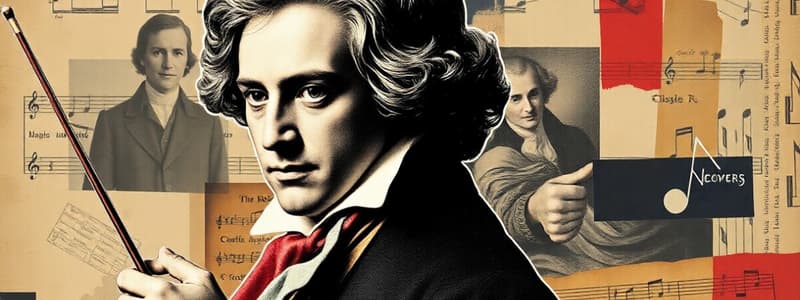Podcast
Questions and Answers
What motivated Beethoven to compose music?
What motivated Beethoven to compose music?
- The financial incentives provided by patrons and the demand for new compositions.
- The ambition to surpass other renowned composers of his time in skill and innovation.
- The desire for fame and recognition within Vienna's elite musical circles.
- A profound dedication to his craft and the emotional experiences he underwent. (correct)
How did Napoleon's actions affect Beethoven's Third Symphony?
How did Napoleon's actions affect Beethoven's Third Symphony?
- Beethoven revised the symphony's musical structure to reflect his disillusionment with Napoleon.
- Beethoven withdrew the symphony from public performance in protest of Napoleon's actions.
- Beethoven rededicated the symphony to a different prominent figure after Napoleon's self-coronation.
- Beethoven removed the dedication to Napoleon from the symphony in a display of his disapproval. (correct)
What method did Beethoven use to communicate effectively in his later years?
What method did Beethoven use to communicate effectively in his later years?
- Written notes exchanged with individuals.
- Conversation books to facilitate interactions. (correct)
- Sign language with close friends and family.
- A specialized form of musical notation to convey messages.
Which of Beethoven's symphonies is considered the most renowned?
Which of Beethoven's symphonies is considered the most renowned?
Which symphony was composed when Beethoven was almost completely deaf?
Which symphony was composed when Beethoven was almost completely deaf?
Which of Beethoven's symphonies is known as the Pastoral?
Which of Beethoven's symphonies is known as the Pastoral?
What unique element distinguishes Beethoven's 9th Symphony from his earlier works?
What unique element distinguishes Beethoven's 9th Symphony from his earlier works?
Approximately what percentage of his hearing had Beethoven lost when he composed his 3rd Symphony?
Approximately what percentage of his hearing had Beethoven lost when he composed his 3rd Symphony?
Which of the following accurately describes Beethoven during his early years?
Which of the following accurately describes Beethoven during his early years?
Which symphony faced less popularity than the others?
Which symphony faced less popularity than the others?
Flashcards
Ludwig van Beethoven
Ludwig van Beethoven
A famous composer known as a child prodigy and greatest in Vienna.
Beethoven's Early Life
Beethoven's Early Life
He was dedicated to music from a young age and recognized as a prodigy.
Napoleon
Napoleon
French commander whose rise caused Beethoven's change of dedication.
3rd Symphony
3rd Symphony
Signup and view all the flashcards
Beethoven's Deafness
Beethoven's Deafness
Signup and view all the flashcards
Conversation Books
Conversation Books
Signup and view all the flashcards
5th Symphony
5th Symphony
Signup and view all the flashcards
6th Symphony
6th Symphony
Signup and view all the flashcards
7th Symphony
7th Symphony
Signup and view all the flashcards
9th Symphony
9th Symphony
Signup and view all the flashcards
Study Notes
Beethoven's Life and Music
- Beethoven dedicated his life to music, becoming a prominent figure in the classical era.
- His early life was marked by recognition as a child prodigy.
- Later, he became the most sought-after composer and pianist in Vienna.
- His exceptional work was influenced by the struggles and isolation of his loss of hearing.
- His compositions broke new ground and influenced future Romantic composers.
Revolutionary Music
- During the years Beethoven wrote his first eight symphonies, Europe was embroiled in war.
- Napoleon Bonaparte's French armies fought numerous European powers.
- Beethoven initially admired Napoleon, dedicating his 3rd symphony to him.
- However, after Napoleon crowned himself Emperor, Beethoven was angered and tore up the dedication.
- Vienna suffered French occupation during this period.
Beethoven's Hearing Loss
- Beethoven's hearing loss gradually worsened over time.
- The exact cause of his deafness remains unknown.
- Symptoms of his condition were documented in letters.
- Various treatments and hearing aids were attempted.
- His deafness led to isolation but also inspired his unique compositional style.
Beethoven's Conversation Books
- In his later years, Beethoven used conversation books to communicate with others.
Beethoven's Symphonies and Hearing Loss
- This timeline depicts how Beethoven's symphonies relate to the gradual loss of his hearing.
- His 3rd symphony was dedicated to Napoleon.
- Some symphonies were more successful than others (the 5th being among the most famous, and the 6th, also known as the Pastoral, showcasing the Austrian countryside.)
- His 7th and 8th symphonies were composed during a time of intense hearing loss, and displayed a new style and feelings of beauty.
- Beethoven's 9th symphony was composed when he was completely deaf, marked a bold innovation; it combined an orchestra with singers.
Studying That Suits You
Use AI to generate personalized quizzes and flashcards to suit your learning preferences.




